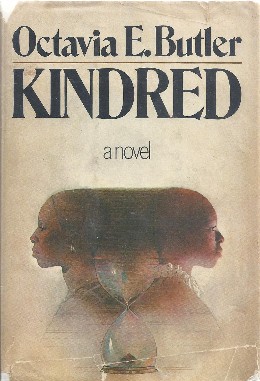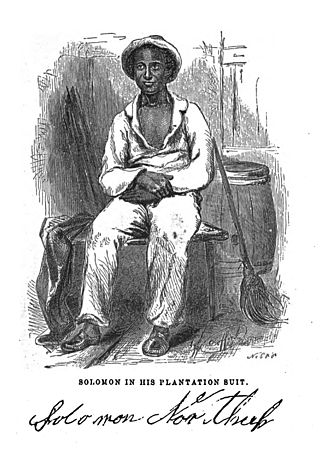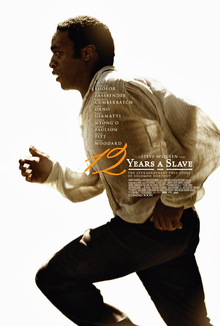
Gone with the Wind is a novel by American writer Margaret Mitchell, first published in 1936. The story is set in Clayton County and Atlanta, both in Georgia, during the American Civil War and Reconstruction Era. It depicts the struggles of young Scarlett O'Hara, the spoiled daughter of a well-to-do plantation owner, who must use every means at her disposal to claw her way out of poverty following Sherman's destructive "March to the Sea." This historical novel features a coming-of-age story, with the title taken from the poem "Non Sum Qualis eram Bonae Sub Regno Cynarae", written by Ernest Dowson.

The Underground Railroad was used by freedom seekers from slavery in the United States and was generally an organized network of secret routes and safe houses. Enslaved Africans and African Americans escaped from slavery as early as the 16th century and many of their escapes were unaided, but the network of safe houses operated by agents generally known as the Underground Railroad began to organize in the 1780s among Abolitionist Societies in the North. It ran north and grew steadily until the Emancipation Proclamation was signed in 1863 by President Abraham Lincoln. The escapees sought primarily to escape into free states, and from there to Canada.

Uncle Tom's Cabin; or, Life Among the Lowly is an anti-slavery novel by American author Harriet Beecher Stowe. Published in two volumes in 1852, the novel had a profound effect on attitudes toward African Americans and slavery in the U.S., and is said to have "helped lay the groundwork for the [American] Civil War".

Queen: The Story of an American Family is a 1993 partly factual historical novel by Alex Haley and David Stevens.

The Autobiography of Miss Jane Pittman is a 1971 novel by Ernest J. Gaines. The story depicts the struggles of Black people as seen through the eyes of the narrator, a woman named Jane Pittman. She tells of the major events of her life from the time she was a young slave girl in the American South at the end of the Civil War.

Valerie Martin is an American novelist and short story writer.

The Known World is a historical novel by American author Edward P. Jones, published in 2003. Set in antebellum Virginia, the novel explores the complex and morally ambiguous world of slavery, focusing on the unusual phenomenon of black enslavers. The book received widespread critical acclaim for its innovative storytelling, richly drawn characters, and profound examination of power, race, and the human condition in the context of American slavery.

James Madison's Montpelier, located in Orange County, Virginia, was the plantation house of the Madison family, including Founding Father and fourth president of the United States James Madison and his wife, Dolley. The 2,650-acre (1,070 ha) property is open seven days a week.
Anna Madgigine Jai Kingsley, born Anta Madjiguène Ndiaye, also known as Anna Kingsley, Anta Majigeen Njaay or Anna Madgigine Jai, was a West African from present-day Senegal, who was enslaved and sold in Cuba, probably via the slave pens on Gorée Island. In Cuba she was purchased, as wife, by plantation owner and slave trader Zephaniah Kingsley. After his death, she became a planter and slave owner in her own right, as a free Black woman in early 19th-century Florida.

Kindred (1979) is a novel by American writer Octavia E. Butler that incorporates time travel and is modeled on slave narratives. Widely popular, it has frequently been chosen as a text by community-wide reading programs and book organizations, and for high school and college courses.

Twelve Years a Slave is an 1853 memoir and slave narrative by Solomon Northup as told to and written by David Wilson. Northup, a black man who was born free in New York state, details himself being tricked to go to Washington, D.C., where he was kidnapped and sold into slavery in the Deep South. He was in bondage for 12 years in Louisiana before he was able to secretly get information to friends and family in New York, who in turn secured his release with the aid of the state. Northup's account provides extensive details on the slave markets in Washington, D.C., and New Orleans, and describes at length cotton and sugar cultivation and slave treatment on major plantations in Louisiana.
The Levi Jordan Plantation is a historical site and building, located on Farm to Market Road 521, 4 miles (6.4 km) southwest of the city of Brazoria, in the U.S. state of Texas. Founded as a forced-labor farm worked by enslaved Black people, it was one of the largest sugar and cotton producing plantations in Texas during the mid-19th century, as well as a local center of human trafficking.
Zephaniah Kingsley Jr. was English-born planter, merchant and slave trader who moved as a child with his family to the Province of South Carolina and enjoyed a successful mercantile career. He built four plantations in the Spanish colony of Florida near what is now Jacksonville, Florida. He served on the Florida Territorial Council after Florida was acquired by the United States in 1821. Kingsley Plantation, which he owned and where he lived for 25 years, has been preserved as part of the Timucuan Ecological and Historic Preserve, run by the United States National Park Service. Finding his large and complicated family progressively more insecure in Florida, he moved them to a vanished plantation, Mayorasgo de Koka, in what was then Haiti but soon became part of the Dominican Republic.

Lauren Groff is an American novelist and short story writer. She has written five novels and two short story collections, including Fates and Furies (2015), Florida (2018), Matrix (2022), and The Vaster Wilds (2023).
Jane Harris is a British writer of fiction and screenplays. Her novels have been published in over 20 territories worldwide and translated into many different languages. Her most recent work is the novel Sugar Money which has been shortlisted for several literary prizes.

The Women's Prize for Fiction (previously with sponsor names Orange Prize for Fiction, Orange Broadband Prize for Fiction and Baileys Women's Prize for Fiction is one of the United Kingdom's most prestigious literary prizes. It is awarded annually to a female author of any nationality for the best original full-length novel written in English and published in the United Kingdom in the preceding year. A sister prize, the Women's Prize for Non-Fiction, was launched in 2023.

12 Years a Slave is a 2013 biographical drama film directed by Steve McQueen from a screenplay by John Ridley, based on the 1853 slave memoir Twelve Years a Slave by Solomon Northup, an African American man who was kidnapped in Washington, D.C. by two conmen in 1841 and sold into slavery. He was put to work on plantations in the state of Louisiana for 12 years before being released. The first scholarly edition of David Wilson's version of Northup's story was co-edited in 1968 by Sue Eakin and Joseph Logsdon.

A Million Nightingales is a 2006 historical novel by Susan Straight. The novel is about Moinette Antoine, a beautiful and self-educated slave of mixed race living in Louisiana in the early to mid-19th century. Moinette narrates her own story from age 14 when she is taken from her mother to the end of her life when she has become a free woman and business owner. The first-person narration is done in a stream of consciousness style that focuses on Moinette's insightful thoughts and impressions of the strange and brutal world around her.

The Long Song is a historical novel by Andrea Levy published in 2010 that was the recipient of the Walter Scott Prize. It was Levy's fifth and final novel, following the 2004 publication of Small Island. In December 2018, a three-part television adaptation of the same name was broadcast on BBC One; The Long Song was aired on PBS in February 2021.

The Underground Railroad is a historical fiction novel by American author Colson Whitehead, published by Doubleday in 2016. The alternate history novel tells the story of Cora, a slave in the Antebellum South during the 19th century, who makes a bid for freedom from her Georgia plantation by following the Underground Railroad, which the novel depicts as a rail transport system with safe houses and secret routes. The book was a critical and commercial success, hitting the bestseller lists and winning several literary awards, including the Pulitzer Prize for Fiction, the National Book Award for Fiction, the Arthur C. Clarke Award, and the 2017 Andrew Carnegie Medal for Excellence. A TV miniseries adaptation, written and directed by Barry Jenkins, was released in May 2021.
















